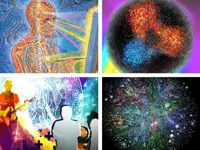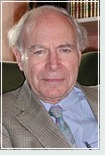|
TRANSLATE THIS ARTICLE
Integral World: Exploring Theories of Everything
An independent forum for a critical discussion of the integral philosophy of Ken Wilber
SEE MORE ESSAYS WRITTEN BY FRANK VISSER
Ken Wilber's
“Creativism”
God and the New Biology
Frank Visser
It all sounds inspiring and empowering to see God as immanent in Nature and the process of evolution, until you start to ask questions.
Two themes stand out in recent Integral communications and the titles of upcoming integral events. One is "Evolutionary Spirituality" or "Evolutionary Enlightenment". The idea, discussed in Andrew Cohen's book of the same title, Evolutionary Enlightenment, is that spirituality supposedly has entered a new phase. Spirituality has become "evolutionary" now that we have "understood" that evolution is driven by a cosmic spiritual Force, which is called Eros by Wilber. And by aligning ourselves with that Force, we are spearheading the next phase in human (and cosmic) evolution. Evolution has become conscious of itself.
 "Kosmic Creativity"
"Kosmic Creativity"
The other theme, highlighted in title of the the upcoming Integral Spiritual Experience seminar which is to be held at Pacific Grove, California at the end of 2011, is "Kosmic Creativity". One recalls here of course that the planned Volume 2 of Wilber's Kosmos trilogy is titled "Kosmic Karma and Creativity". Here, the idea is that our own creativity is no different from the Creativity in the Kosmos at large. Again, by aligning ourselves with that Kosmic dimension, we can draw from this unfathomable source of creative energy. Creativitly firmly stands at the center of this religion.
The equation Creativity—Eros—Spirit—God is easily made. We are spiritual insofar as we are creative, and vice versa. Or something to that effect.
To substantiate these sentiments, Wilber often loosely gives out examples from the field of science to "support" his thesis that all these phenomena could not possibly have arisen without the help of the "gentle push" of Spirit. I have summed up this whole controversy in "The 'Spirit of Evolution' Reconsidered", last year's Integral Theory Conference lecture. In the past, Wilber's favorite examples were: the complexity of the human eye, of the bird's wings, or the human immune system. More recently, he has referred to the evolution of the chemical elements, as evidence of a Creative Force in Nature, a "creative advance into novelty", as Whitehead has it. Without exception, these examples have been heavily criticized as unfounded and misleading.
Whitehead's philosophy, often called "process philosophy", is an American theologian's response to the challenge posed by evolutionary theory to religion. Wilber frequently cites Whitehead approvingly, and uses many of this phraseology in his written and spoken utterances. For Ken Wilber, creativity is something that needs no further explanation, it is a fundamental principle of existence. From A Brief History of Everything (1996), in the paragraph called "Creative Emergence":
... the point is, as Whitehead put it , "the ultimate metaphysical ground is the creative advance into novelty." New holons creatively emerge. Holons, creativity—these are some of the most basic categories that we need to think of before we can think about anything else at all! (p. 24)
One could say this sums up Wilber's basic outlook on life. Creativity is central to the universe, and to our own lives, and there's a deep connection between the two dimensions. This philosophical worship of creativity is not creationism proper, it is, as I would like to call it, "creativism"—ah, I now see it already exists. But like its creationist cousin, creativism lacks a sturdy foundation in evolutionary science. Instead, the term "evolution" is borrowed by Wilber and Cohen from science and given a decidedly religious meaning, and conversely, an essentially religious philosophy of life is given apparent scientific credibility by this move. It doesn't give any insight into Nature's workings. In fact, it stops science dead in its tracks.
None of this is questioned by a growing community of "integralists" or so-caled "evolutionaries", as they increasingly call themselves. It's time to frame this movement within the wider context of other approaches looking for a synthesis of religion and science, in this case biology.
GOD AND BIOLOGY
 Arthur Peacocke
Arthur Peacocke
In God and the New Biology (1986), written by the late Anglican priest and scientist Arthur Peacocke (1924-2006), we find a helpful overview of historical and philosophical positions. Peacocke won the famous Templeton Prize in 2001.
From Wikipedia, where Peacocke's process-as-immance views are discussed:
The process-as-immanence argument is meant to deal with Phillip Johnson’s contention that naturalism reduces God to a distant entity. According to Peacocke, God continuously creates the world and sustains it in its general order and structure; He makes things make themselves. Biological evolution is an example of this and, according to Peacocke, should be taken as a reminder of God’s immanence. It shows us that "God is the Immanent Creator creating in and through the processes of natural order." (473, original italics) Evolution is the continuous action of God in the world. All "the processes revealed by the sciences, especially evolutionary biology, are in themselves God-acting-as-Creator". (474)
This reminds one of Wilber's 2006 audio statements on his view of evolution as driven by an "immanent" Eros:
"You either postulate a supernatural source of which there are two types. One is a Platonic given and one is basically theological—a God or intelligent design—or you postulate Spirit as immanent—of course it's transcendent but also immanent—and it shows up as a self-organizing, self-transcending drive within evolution itself. And then evolution is Spirit's own unfolding. Not in super-natural, but an intra-natural, an immanently natural aspect. And that's basically the position I maintain
In Peacocke's view, "the processes revealed by the sciences, especially evolutionary biology, are in themselves God-acting-as-Creator". This could have been stated by Wilber as well, if God is replaced by Spirit or Eros, and Creator with Creativity. The difference between the two authors is that Peacocke seems to affirm all or most of evolutionary science's results, but simply adds to this that essentially this is all done by God, whereas Wilber writes much more depreciatively of science's attemts at explaining the phenomena of evolution. For Wilber, Nature is in need of Spirit's help, where Peacocke seems to equate God with Nature.
For one thing, Peacocke is much, much more informed about the life sciences then Wilber ever was. He understands, contrary to Wilber, that controversies within biological theory, heated as they may be, are often well within the Darwinian framework, and can't be used to cast doubt on that framework. And he gets in what sense the processes of evolution are random:
The late Jacques Monod, in Chance and Necessity, contrasted the 'chance' processes that bring about mutations in the genetic material of an organism and the 'necessity'of their consequences to and needs of the organisms. The two causal chains are entirely independent and so Monod was correct, to that extent, in saying that evolution depends on chance. (p. 62)
 Kenneth Miller
Kenneth Miller
Similar ideas can be found in the interesting book Finding Darwin's God, written by the American cell biologist and Roman Catholic Kenneth Miller. In this book Intelligent Design is brilliantly refuted, though a not entirely convincing solution to the religion-and-science conflict is proposed. (In this respect, do read Michael Ruse's review of Miller's book). Miller seems to suggest that for Darwin, Nature was his God, so there's no longer a conflict between religion and science—or has religion evaporated here?
Interestingly, Peacocke has written about the relationships between science and religion in his The Sciences and Theology in the Twentieth Century, as summarized on Wikipedia:
- Science and theology are concerned with two distinct realms
- Science and theology are interacting approaches to the same reality
- Science and theology are two distinct non-interacting approaches to the same reality
- Science and theology constitute two different language systems
- Science and theology are generated by quite different attitudes (in their practitioners)
- Science and theology are both subservient to their objects and can only be defined in relation to them
- Science and theology may be integrated
- Science generates a metaphysic in terms of which theology is then formulated
In The Marriage of Senseo and Soul (1998), Wilber has attempted his own "integration" of science and religion, specifying various types of science, and of religion or spirituality. Incidentally, both of Peacocke's books are listed in the bibliographical references of Wilber's magnum opus Sex, Ecology, Spirituality (1995).
Reflection
If Eros is so essential to evolution, what happened to Thanatos? Is that perhaps responsible for the major extinctions that have hit evolution in the past?
What strikes me as odd in these attempts by both Wilber and Peacocke is that it all sounds inspiring and empowering to see God as immanent in Nature and the process of evolution, until you start to ask questions.
If Eros is so essential to evolution, what happened to Thanatos? Is that perhaps responsible for the major extinctions that have hit evolution in the past? Even if Wilber wrote about Thanatos in his Wilber-2 years (in The Atman Project (1980) and Up from Eden (1981), in his later writings Eros features much more prominently in his dealings with evolution. And if God's Love brings atoms, molecules, human beings and eventually the world's nations together, is He also the driving force behind HIV or the Klebsiella virus?
What kind of worldview is this?
 Sean B. Carroll
Sean B. Carroll
My greatest objection to this view of evolution is that, however sophisticated the presentation may be, it all boils down to "Plants grow because God makes them grow". For one thing, that teaches us so very little about how plants actually grow. Even a cursory check of The Making of the Fittest (2006) by Sean B. Carroll (or his previous book Endless Forms Most Beautiful, 2005) gives one a plethora of insights from the new field of "Evo Devo" into how the processes of Nature actually work, to the very level of the gene, nay the level of the indvidual base pair constituting a gene.
Eros is far, far away.
As mentioned many times before, the integral community doesn't really seem to care about these probing questions into the validity of this particular integral view of evolution. But then again, what can we expect of true believers? Building your spirituality on an ill-understood science, is building your house on sand.
|

 Frank Visser, graduated as a psychologist of culture and religion, founded IntegralWorld in 1997. He worked as production manager for various publishing houses and as service manager for various internet companies and lives in Amsterdam. Books: Ken Wilber: Thought as Passion (SUNY, 2003), and The Corona Conspiracy: Combatting Disinformation about the Coronavirus (Kindle, 2020).
Frank Visser, graduated as a psychologist of culture and religion, founded IntegralWorld in 1997. He worked as production manager for various publishing houses and as service manager for various internet companies and lives in Amsterdam. Books: Ken Wilber: Thought as Passion (SUNY, 2003), and The Corona Conspiracy: Combatting Disinformation about the Coronavirus (Kindle, 2020). 


